
The Bolsheviks, led by Vladimir Lenin, were a far-left faction of the Marxist Russian Social Democratic Labour Party (RSDLP) which split with the Mensheviks at the Second Party Congress in 1903. The Bolshevik party, formally established in 1912, seized power in Russia in the October Revolution of 1917, and was later renamed the Russian Communist Party, All-Union Communist Party, and Communist Party of the Soviet Union. The party's ideology, based on Leninist and later Marxist–Leninist principles, is known as Bolshevism.
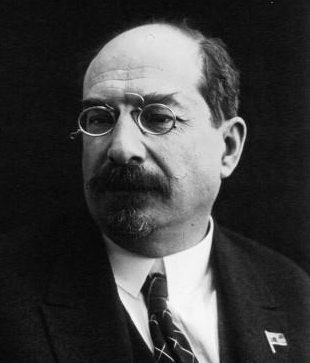
Anatoly Vasilyevich Lunacharsky was a Russian Marxist revolutionary and the first Bolshevik Soviet People's Commissar (Narkompros) responsible for the Ministry of Education as well as an active playwright, critic, essayist, and journalist throughout his career.
The history of the Communist Party of the Soviet Union was generally perceived as covering that of the Bolshevik faction of the Russian Social Democratic Labour Party from which it evolved. In 1912, the party formally split, and the predecessor to the Communist Party of the Soviet Union became a distinct entity. Its history since then can roughly be divided into the following periods:

Proletkult, a portmanteau of the Russian words "proletarskaya kultura", was an experimental Soviet artistic institution that arose in conjunction with the Russian Revolution of 1917. This organization, a federation of local cultural societies and avant-garde artists, was most prominent in the visual, literary, and dramatic fields. Proletkult aspired to radically modify existing artistic forms by creating a new, revolutionary working-class aesthetic, which drew its inspiration from the construction of modern industrial society in backward, agrarian Russia.
The Prague Conference, officially the 6th All-Russian Conference of the Russian Social Democratic Labour Party, was held in Prague, Austria-Hungary, on 5–17 January 1912. Sixteen Bolsheviks and two Mensheviks attended, although Joseph Stalin and Yakov Sverdlov were unable to attend because they were in internal exile at the time, while Georgi Plekhanov claimed he was too ill to attend. At the conference, Vladimir Lenin and his supporters broke away from the rest of the Russian Social Democratic Labour Party and formed their own predominantly Bolshevik Russian Social Democratic Labour Party. The conference was meant to be secret; Lenin had instructed: "No-one, no organisation must know about this". However, every detail was known to the Okhrana, the secret police of the Russian Empire.

Ivar Tenisovich Smilga was a Latvian Bolshevik leader, Soviet politician and economist. He was a member of the Left Opposition in the Soviet Union.

Matvei Konstantinovich Muranov was a Ukrainian Bolshevik revolutionary, Soviet politician and statesman.

Ivan Ivanovich Skvortsov-Stepanov was a prominent Russian Bolshevik revolutionary and Soviet politician.
Proletary was an illegal Russian Bolshevik newspaper edited by Lenin; it was published from September 3, 1906, until December 11, 1909. A total of fifty issues having appeared. Active participants in the editorial work were Mikhail Vladimirsky, V. V. Vorovsky, I. F. Dubrovinsky, Anatoly Lunacharsky. Alexander Bogdanov had originally been on the editorial board, but he resigned, being replaced by Virgil Shantser on 13 August 1908. The technical side of publication was in the hands of Alexander Schlichter, E. S. Schlichter and others. The first twenty issues of the paper were edited and set up in Vyborg. Later, in view of growing difficulties in the way of publishing an illegal newspaper in Russia, the St. Petersburg and Moscow Committees of the Russian Social Democratic Labour Party decided that publication of the newspaper should be organised abroad. Nos. 21 to 40 were published in Geneva and Nos. 41 to 50 in Paris.
Vpered was a subfaction within the Russian Social Democratic Labour Party (RSDLP). Although Vpered emerged from the Bolshevik wing of the party, it was critical of Lenin. The group was gathered by Alexander Bogdanov in December 1909 and was active until 1912. Other notable members of the group were Maxim Gorky, Anatoly Lunacharsky, Mikhail Pokrovsky, Virgil Shantser, Grigory Aleksinsky, Stanislav Volski, and Martyn Liadov.

The 3rd Congress of the Russian Social Democratic Labour Party was held during 25 April - 10 May [(12–27 April O.S.)] 1905 in London, UK.

The 1907 Tiflis bank robbery, also known as the Erivansky Square expropriation, was an armed robbery on 26 June 1907[a] in the city of Tiflis in the Tiflis Governorate in the Caucasus Viceroyalty of the Russian Empire. A Bolshevik group "expropriated" a bank cash shipment to fund their revolutionary activities. The robbers attacked a bank stagecoach, and the surrounding police and soldiers, using bombs and guns while the stagecoach was transporting money through Erivansky Square between the post office and the Tiflis branch of the State Bank of the Russian Empire. The attack killed forty people and injured fifty others, according to official archive documents. The robbers escaped with 241,000 rubles.

Gleb Ivanovich Bokii was a Soviet Communist political activist, revolutionary, and paranormal investigator in the Russian Empire. Following the October Revolution of 1917, Bokii became a leading member of the Cheka, the first Soviet secret police, and later of the OGPU and NKVD.

Alexander Aleksandrovich Bogdanov, born Alexander Malinovsky, was a Russian and later Soviet physician, philosopher, science fiction writer and Bolshevik revolutionary. He was a polymath who pioneered blood transfusion, as well as general systems theory, and made important contributions to cybernetics.
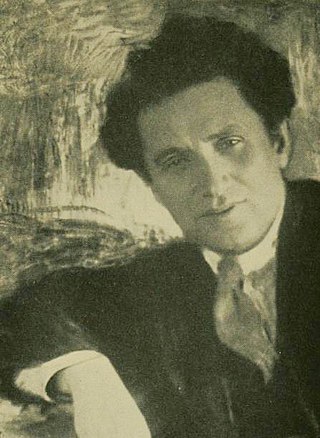
Grigory Yevseyevich Zinoviev was a Russian revolutionary and Soviet politician. A prominent Old Bolshevik, Zinoviev was Vladimir Lenin's closest associate prior to 1917 and a leading government figure in the early Soviet Union, serving as chairman of the Communist International (Comintern) from 1919 to 1926.

Lev Borisovich Kamenev was a Russian revolutionary and Soviet politician. An Old Bolshevik, Kamenev was a leading figure in the early Soviet government, serving as the first head of state of the Russian SFSR as chairman of the All-Russian Congress of Soviets, and as a deputy premier of the Soviet Union from 1923 to 1926, among other roles.
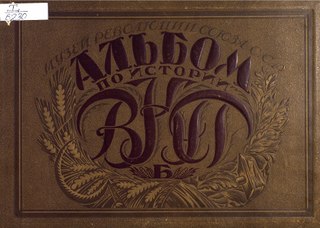
The 6th Congress of the Russian Social Democratic Labour Party (bolsheviks) was held during 26 July – 3 August (N.S. 8–16 August) 1917 in Petrograd, Russia. It elected the 6th Central Committee. This was the first Congress of the Bolsheviks following their 1912 split from the Russian Social Democratic Labour Party (RSDLP). The previous, 5th Congress (1907) was the last congress of the united RSDLP (with both Bolsheviks and Mensheviks attending). The Mensheviks held their own Congress few weeks later, also in Petrograd.
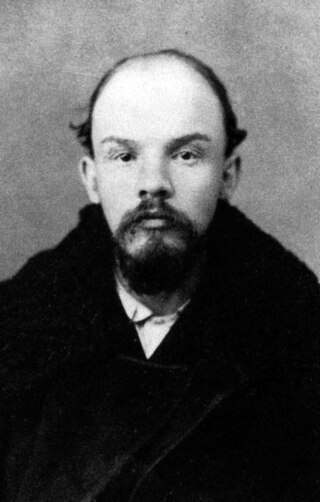
The Russian communist revolutionary and politician Vladimir Lenin began his active revolutionary activity in 1892, and continued till assuming power in the Russian Revolution of 1917. Following on from his early life, during which he had become devoted to the cause of revolution against the Tsarist regime in the Russian Empire and converted to Marxism, Lenin moved to St. Petersburg. There he joined a revolutionary cell, and became a vocal advocate for Marxism within the revolutionary socialist movement. Entering a relationship with fellow Marxist Nadezhda Krupskaya, he toured Western Europe to build ties with other Russian revolutionary emigres and learn more about the international Marxist movement. Upon returning to Russia, he was arrested for sedition in 1895 and exiled to Shushenskoye in the Minusinsky District of eastern Siberia for three years. There, he devoted his time to translating and writing revolutionary texts, marrying Krupskaya in July 1898.
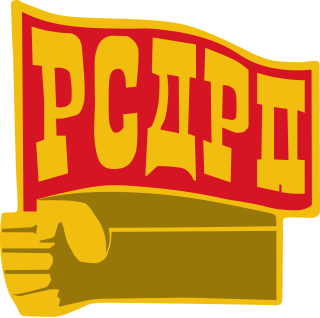
The Russian Social Democratic Labour Party (RSDLP), also known as the Russian Social Democratic Workers' Party or as the Russian Social Democratic Party, was a socialist political party founded in 1898 in Minsk.

Nikolai Aleksanderovich Rozhkov was a Russian historian who became an active revolutionary in the Russian Social Democratic Labour Party.















